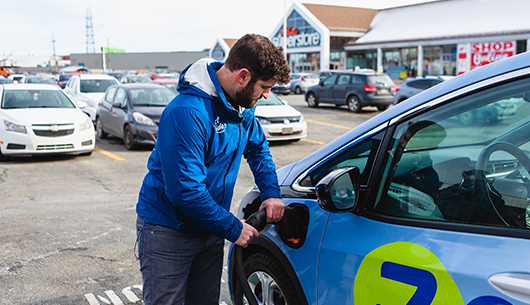Level 2 – Convenient Home or Destination Charging
Level 2 chargers are the most common option for convenient at-home charging, capable of fully charging your EV overnight, providing 16 to 97km of range per hour charged, depending on the type of EV. You'll need the support of a qualified electrician to complete an installation as they require a 240 V dedicated circuit like any major appliance like dryers and ovens, ranging from 30 to 80 amps.
You may also find this type of charger at commercial destinations, like hotels, restaurants, and retailers.
Find a contractor near you to connect with a certified installer in your area. The support of a qualified electrician is critical to ensure chargers are installed properly and to the highest standards of safety and quality.






